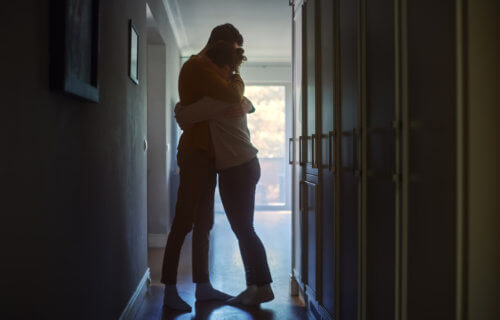AUSTIN, Texas — The old saying that “every cloud has a silver lining” is apparently true — even if that cloud is part of a hurricane. According to researchers from the University of Texas at Austin, natural disasters have the power to bring married couples closer together.
Study authors looked at couples living in the Houston area both before and after Hurricane Harvey arrived in August 2017 to reach these conclusions. While this work may raise some eyebrows, researchers maintain that these findings hold serious value when it comes to sculpting new ways to help couples and families navigate stressful situations.
Just before Harvey hit the Texas coast, the research team had already surveyed 231 newlywed couples on their overall relationship satisfaction. After Harvey arrived and destroyed a significant portion of Houston, researchers saw a unique opportunity to track relationship dynamics throughout and after surviving a natural disaster. This is the first ever relationship study focusing on such unique events.
“We originally set out to study the effects of everyday stressors, such as financial problems and the transition to parenthood, on couples in the early years of their marriage,” says lead study author Hannah Williamson, assistant professor of human development and family sciences, in a university release. “When the hurricane hit in the middle of the study, it allowed us to look at the effects of a major acute stressor. Unfortunately, more and more people are going through disasters such as hurricanes and wildfires.”
An attitude of gratitude after disaster strikes
Interestingly, directly after the hurricane, couples reported experiencing a “significant boost” in their relationship satisfaction. This surprised even the study authors, as most prior research focusing on the effect of stressors on relationships finds they lead to more arguments and dissatisfaction.
“Based on previous studies, we expected to see people who were happy with their relationships before the hurricane would be even happier afterwards, and people who were unhappy would be more unhappy,” Prof. Williamson adds. “We actually saw the biggest jumps in relationship satisfaction among the couples who were the most unhappy before the hurricane.”
The team asked each couple about their personal experiences and losses during Harvey, including damage to their homes and financial losses. Surprisingly, those factors didn’t seem to make much difference. Across the board, couples felt closer to one another after Harvey.
It’s important to note that this reported satisfaction boost was indeed temporary. Within a year most couples were back to their pre-hurricane levels of relationship satisfaction.
“A natural disaster can really put things in perspective. People realize how important their partner is to them when they are jolted out of the day-to-day stress of life,” Prof. Williamson concludes. “There may be therapeutic applications to this if couples can shift their perspective in a similar way without having to go through a natural disaster.”
The study is published in Psychological Science.
